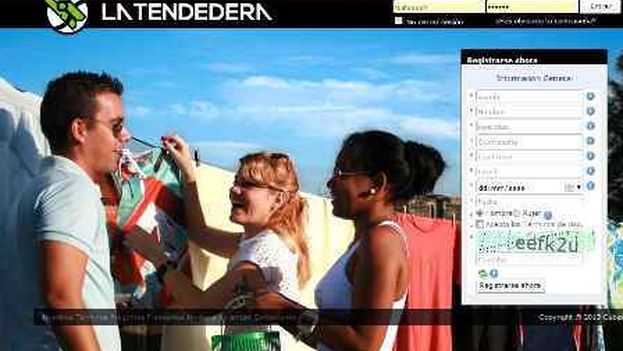
14ymedio, Luzbely Escobar, Havana, 5 December 2014 – Although its organizers deny it, La Tendedera (The Clothesline) is trying to emulate Facebook inside Cuba. The competition is tough because among the youngest on the Island Mark Zuckerberg’s social network has many followers. More than a year after its creation, its tropical competition has only managed to attract 4,500 users, and there are no clear figures on how many are really active.
In an interview published Wednesday by the newspaper Juventud Rebelde (Rebel Youth), Kirenia Fagundo, leader of the project Cuba Va (Cuba Goes), which includes La Tendedera, tells readers about the obstacles and challenges facing the digital site. At the beginning, the social network was designed for those without access to the Internet, the young woman explained. However, currently it is only possible to access it from the Youth Computer Clubs, which inhibits its expansion and is an inconvenience for users.
Presented to the public on 7 September of last year, La Tendedera isn’t hosted at the Cuba Telecommunications Company (ETECSA) national data center, which “would facilitate connectivity through the intranet.” The programmers didn’t want to wait for it to be ready and opened public access to those attending the Youth Clubs. A mistake that has been detrimental to the quality and expansion of the service.
The slowness at which the website loads is one of the problems most mentioned by La Tendera’s users. The platform is way too heavy for the low speed Cuban networks. Although, according to Fagundo, it’s hoped that a lighter version will be hosted on the ETECSA servers and finally be accessible from the national intranet.
On inquiring among several users, what comes to light is not only the speed and the access restrictions which conspire against this tropical emulation of Facebook. The most widespread criticism, not reported by the newspaper Juventud Rebelde, is the impossibility of interacting with users beyond our national borders. You can only connect with other domestic users who have registered on the service. “If I travel outside the country I can’t update my profile, because you can only access it inside Cuba,” says Julian Casanovas, a high school student.
The announcement a few weeks ago, that Youth Club will begin to charge for its services, has been a new obstacle for La Tendedera, although the majority of these sites still having implemented the charge. “If only a few people come here now, imagine when you have to pay to do it,” says the administrator of one of the sites in the Plaza of the Revolution municipality, who asked to remain anonymous.
La Tendedera’s creators don’t appear to have learned the lesson. Despite the great limitations imposed by the Cuban networks’ slow speeds and lack of connectivity, they are planning to create a national version of Twitter, provisionally called Pitazo (Whistle). Will this new project also languish before the indifference of users and the competition from the large social networks? The answer can already be anticipated. Cuban users don’t seem disposed to put up with limitations.
